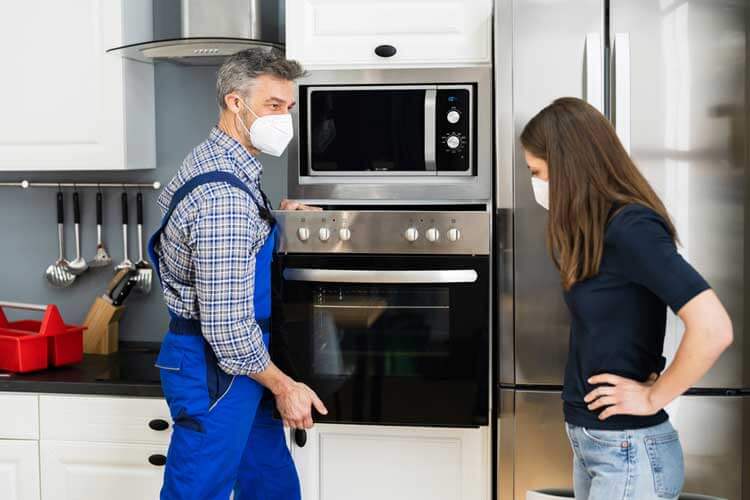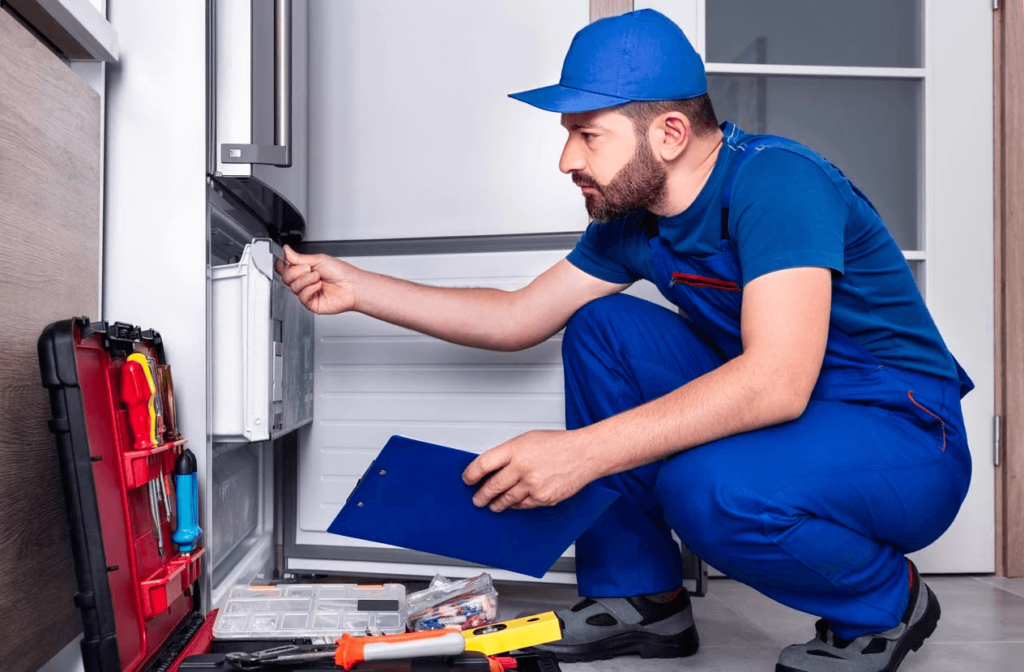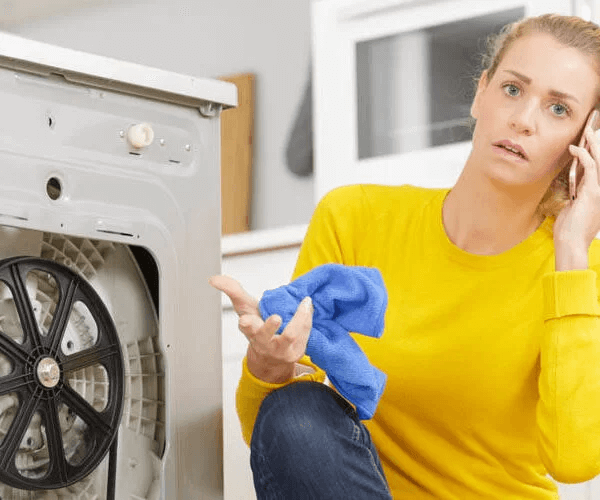
Appliances, those unsung heroes of our daily lives, can sometimes choose the most inconvenient moments to let us down. Your washing machine decides to flood the laundry room right before a big dinner party, or your trusty refrigerator warms up on the hottest day of the year. When such appliance emergencies strike, knowing how to handle the situation can mean the difference between a minor inconvenience and a major crisis. In this comprehensive guide, we’ll explore the ins and outs of dealing with emergency appliance repairs, from quick fixes to finding reliable professionals. So, when life throws you a curveball, you’ll be ready to hit it out of the park.
The Initial Panic: What to Do When an Appliance Fails
Question: What’s the first step when an appliance goes haywire?
The initial reaction to an appliance meltdown is often one of panic. But before you start frantically Googling repair services or calling your neighbors for recommendations, take a deep breath. Assessing the situation calmly is the first step in handling an appliance emergency effectively. Here’s what you should do:
- Safety First: Your safety should be the top priority. Unplug the malfunctioning appliance to eliminate the risk of electrical shocks or other mishaps.
- Isolate the Issue: Try to identify the specific problem. Is it leaking, making strange noises, or not turning on at all? Pinpointing the issue can help you decide on the best course of action.
- Check for Warranty: If your appliance is still under warranty, it’s crucial to read the warranty terms and conditions carefully. Attempting to repair the appliance yourself might void the warranty, and you could end up shouldering unnecessary expenses.
Quick Fixes for Common Appliance Emergencies

Question: What are some common appliance mishaps and quick fixes?
In some cases, a quick fix can temporarily save the day until you can get professional help. Let’s delve into some of the most common appliance emergencies and how to address them:
- Refrigerator Troubles: If your refrigerator isn’t keeping things cool, the first thing to check is the thermostat settings. Ensure that the temperature is set correctly. Next, confirm there’s proper ventilation around the coils and vacuum the condenser coils if they’re dusty. These simple steps can often revive your fridge.
- Washing Machine Woes: A washing machine leaking water can be a nightmare. Start by inspecting the hoses for cracks or loose connections. Tighten the connections or replace damaged hoses as necessary. This quick fix can prevent a minor leak from becoming a major flood.
- Oven Quirks: If your oven isn’t heating evenly, you can perform a simple test using an oven thermometer. Place it in various areas of the oven to determine if there are temperature discrepancies. Adjust the temperature setting accordingly to ensure your meals cook evenly.
- Dishwasher Dilemmas: When your dishwasher refuses to drain, it’s often due to a clogged filter or a blocked drain hose. Start by cleaning the filter and ensuring it’s free from debris. Then, check the drain hose for any clogs or kinks. Additionally, make sure your garbage disposal, if connected, is functioning correctly.
- Microwave Malfunctions: If your microwave suddenly goes dark and won’t turn on, the first step is to verify that it’s still plugged in and that the outlet is working. Try plugging in another device to ensure there’s power. If the microwave is plugged in, but there’s no power, it might be a fuse issue that you can replace.
The Power of DIY Troubleshooting
Question: Can I attempt DIY repairs on my own?
Absolutely! Many appliance issues can be resolved without professional help, saving you time and money. Here’s a detailed checklist of common DIY troubleshooting steps to get you started:
- Online Resources: The internet is your best friend when it comes to DIY appliance repairs. Explore online forums, watch how-to videos, and consult repair guides. There’s a wealth of information available to guide you through various appliance problems.
- Essential Tools: Make sure you have the necessary tools for basic repairs, such as screwdrivers (both Phillips and flathead), pliers, a multimeter, and a flashlight.
- Safety Measures: Safety should always be a priority. Before working on any appliance, disconnect it from the power source. This simple step can prevent accidents and ensure your safety.
- Consult the Manual: Most appliances come with a user manual that includes troubleshooting tips and diagrams. It’s like a secret codebook for your appliance, providing insights into common issues and solutions.
- Start Small: Begin with the most obvious problems, such as loose connections, clogged filters, or worn-out parts. Many appliance problems have straightforward solutions, but they can be easy to overlook.
- Know Your Limits: It’s essential to recognize your own limitations. If a repair seems beyond your expertise or requires specialized tools, don’t attempt it. Instead, consider calling in a professional to avoid causing further damage.
When to Call in the Pros
Question: What are the signs that it’s time to call a professional?
While DIY troubleshooting can work wonders, there are certain situations where you should leave it to the experts. Here’s a more in-depth look at the signs that indicate it’s time to pick up the phone and call in a professional:
- Electrical Issues: If your appliance shows signs of electrical problems, such as sparking, flickering lights, or tripping breakers, it’s a clear indicator that a professional electrician should be involved. Dealing with electrical issues requires specialized knowledge and training.
- Gas Appliances: For appliances that run on natural gas or propane, such as ovens and water heaters, any issues related to gas should be handled exclusively by a licensed technician. Gas leaks, in particular, are highly dangerous and should never be managed by an unqualified individual.
- Refrigerant Leaks: When your refrigerator isn’t cooling properly and you suspect a refrigerant leak, only certified technicians should handle refrigeration systems. These repairs involve working with potentially harmful substances and specialized equipment.
- Complex Repairs: Appliances have become increasingly complex with digital components and advanced technology. If you find yourself in over your head with an intricate repair, it’s time to call in a specialist. Attempting to fix these issues without the right knowledge and tools can lead to further damage.
- Under Warranty: If your appliance is still under warranty, it’s generally best to let the manufacturer’s authorized service provider handle any repairs. Attempting DIY fixes might void the warranty, leaving you responsible for the cost of repairs.
Finding Reliable Repair Services

Question: How do I choose a reliable appliance repair service?
Selecting the right repair service is a critical step in getting your appliance back in working order. It can be a daunting task, but with some guidance, you can make an informed choice. Here’s a more detailed look at how to find a trustworthy appliance repair service:
- Ask for Recommendations: Start by seeking recommendations from friends, family, or coworkers. Word of mouth referrals often lead to reliable repair services with satisfied customers.
- Read Reviews and Ratings: In the digital age, you have a wealth of information at your fingertips. Check online reviews and ratings on platforms like Yelp, Google, or Angie’s List. Reading about others’ experiences can provide valuable insights into the quality of service provided.
- Check for Certification: Ensure that the technicians sent by the repair service are certified and experienced in working with your specific appliance brand. Certification demonstrates a commitment to professional standards.
- Get Multiple Quotes: Don’t settle for the first quote you receive. Reach out to several repair companies and compare estimates. This allows you to gauge the average cost and find the best value for your money.
- Inquire About Guarantees: Ask about warranties or guarantees on both parts and labor. A reputable service provider will stand by their work, offering you peace of mind in case any issues arise after the repair.
Emergency Appliance Repair Kit: Your Secret Weapon
Question: What should I have on hand for appliance emergencies?
Having an emergency appliance repair kit on standby can be a lifesaver when appliance troubles strike. Here’s a detailed checklist of essential items to keep in your toolkit:
- Screwdrivers: A set of Phillips and flathead screwdrivers in various sizes to accommodate different screws commonly found in appliances.
- Pliers: Handy for gripping, twisting, and bending various components. Needle-nose pliers are particularly useful for reaching tight spots.
- Multimeter: An essential tool for diagnosing electrical issues. With a multimeter, you can measure voltage, resistance, and continuity, helping you pinpoint electrical problems accurately.
- Tape and Sealant: Duct tape, electrical tape, and silicone sealant are invaluable for making temporary fixes. Use them to seal leaks, secure loose wires, or reattach components.
- Flashlight: A reliable flashlight is a must-have to illuminate dark corners and examine your appliance’s interior. LED flashlights are energy-efficient and provide bright, focused light.
- Replacement Parts: Keep a small supply of common replacement parts on hand, such as fuses, belts, and hoses. Having these parts readily available can save you from delays when ordering replacements.
Final Words
When it comes to emergency appliance repairs, staying calm, collected, and well-prepared can make all the difference. Begin by assessing the situation and considering the quick fixes at your disposal. Embrace the power of DIY troubleshooting, but also know when it’s time to call in the professionals. Choosing a reputable repair service can save you from headaches down the line, and having an emergency appliance repair kit on hand can be a real lifesaver.
So, the next time your fridge decides to act frosty or your dishwasher plays hide and seek with your dishes, you’ll know exactly what to do in a pinch. Handling appliance emergencies isn’t just about saving money; it’s about regaining the convenience and functionality of these essential household devices. With the information and guidance provided in this comprehensive guide, you’re well-equipped to tackle any appliance emergency that comes your way. Happy repairing!
Emergency Appliance Repairs: Frequently Asked Questions
Navigating appliance emergencies can be a daunting task, but with the right information and guidance, you can address issues effectively. Here are some frequently asked questions (FAQ) about emergency appliance repairs:
1. What should I do when an appliance breaks down unexpectedly?
When an appliance suddenly fails, the first step is to ensure your safety by unplugging it from the power source. Next, assess the issue to identify the problem. You should also check if the appliance is still under warranty before attempting any DIY fixes.
2. Are there quick fixes for common appliance problems?
Yes, some common appliance issues have quick fixes. For example, if your refrigerator isn’t cooling, check the thermostat settings and ensure proper ventilation. If your washing machine is leaking, inspect the hoses for cracks or loose connections. Detailed quick fixes are outlined in the article above.
3. Can I attempt DIY repairs on my own?
You can certainly attempt DIY repairs if you have the necessary tools and knowledge. Many common appliance problems can be resolved through DIY troubleshooting. The article provides a detailed checklist for DIY troubleshooting, but always prioritize safety and know your limitations.
4. When should I call in a professional for appliance repairs?
It’s best to call a professional in the following situations:
- If you encounter electrical issues like sparking or flickering lights.
- When dealing with gas appliances due to the risks associated with gas leaks.
- For refrigerant leaks in refrigeration systems.
- In the case of complex repairs or issues beyond your expertise.
- When your appliance is still under warranty to avoid voiding it.
5. How do I choose a reliable appliance repair service?
To choose a reliable repair service, consider the following:
- Ask for recommendations from friends and family.
- Read online reviews and ratings on platforms like Yelp, Google, or Angie’s List.
- Ensure the technicians are certified and experienced with your specific appliance brand.
- Get multiple quotes to compare estimates.
- Inquire about warranties or guarantees on parts and labor.
6. What should I have in my emergency appliance repair kit?
An emergency appliance repair kit should include:
- Screwdrivers (Phillips and flathead).
- Pliers.
- Multimeter.
- Tape and sealant.
- Flashlight.
- Common replacement parts like fuses, belts, and hoses.
Having these tools and parts readily available can help you address emergency appliance issues promptly.
7. Is it safe to repair gas appliances on my own?
No, it’s not safe to repair gas appliances on your own. Gas-related problems pose significant risks, including gas leaks, which can be life-threatening. Always hire a licensed technician for gas appliance repairs.
8. Are there specific tools I should have for DIY appliance repairs?
Yes, for DIY appliance repairs, you should have essential tools like screwdrivers (Phillips and flathead), pliers, a multimeter, tape, and sealant. These tools will help you with various troubleshooting and minor repair tasks.
9. How can I prevent appliance emergencies in the future?
To prevent appliance emergencies, it’s essential to perform regular maintenance. This includes cleaning filters, checking for loose connections, and following the manufacturer’s recommended maintenance schedule. Maintaining your appliances can extend their lifespan and reduce the likelihood of sudden breakdowns.
10. What should I do if I encounter a problem not covered in the article?
If you encounter an appliance problem not covered in the article or have concerns about your specific situation, it’s advisable to consult the appliance’s user manual, reach out to the manufacturer’s customer support, or contact a professional appliance repair service for personalized guidance and solutions.